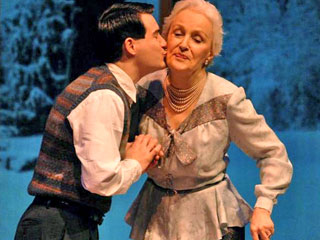Indian Blood
by Anthony Chase

The title may not evoke Christmas trees and visions of sugar plums, but A.R. Gurney’s Indian Blood is a loving Christmas story, set in Buffalo of the 1940s. This is Norman Rockwell in a snow globe. The title refers to 16-year-old Eddie’s belief that his adolescent rebelliousness is due to a Native American ancestor, hidden in his family’s past.
The story is sweet and nostalgic. A crisis ensues when the Latin teacher at Nichol’s School confiscates a dirty picture that Eddie has drawn to entertain the other boys at the back of the room. Except for a rough edge in the marriage of Eddie’s parents, this is about as dangerous as things get in this wistful and lovable play.
The original off-Broadway production, directed by Mark Lamos, was elegant and moving. It featured a powerful cast, including Jack Gilpin and Rebecca Luker, who sang a hauntingly memorable rendition of Cole Porter’s “You’d Be So Nice to Come Home To.” The play seemed custom-ordered for Buffalo’s Studio Arena Theatre. Written by a native son, the play focuses on our city’s mythical past as the Queen City of the Great Lakes, a time when Delaware Avenue was lined with imposing American elm trees and the WASP elite sent their school-age offspring to ballroom dancing lessons. In addition, in an intentional nod to Thornton Wilder’s Our Town, the minimalist play required no major set pieces.
From the perspective of the marketing department, Indian Blood is an unfortunately titled play. While White Christmas has been an easy sell for Shea’s, Indian Blood is proving to be an upward climb at the Studio Arena box office, which is ironic, ethnographically speaking, because there can be no Christmas whiter than a Gurney Christmas. He is the foremost chronicler of WASP culture in the American theater.
I adored the play in New York. Favorite moments replay in my mind from time to time: Father and Mother sharing a private laugh after tag-teaming the discipline of their son after the naughty drawing incident; Grandmother’s natural talent for saying the most bigoted things with casual Victorian obliviousness; Rebecca Luker’s perfect and casual rendition of the Cole Porter tune.
Studio Arena hopes that this nostalgic Christmas confection will resonate in the same way with audiences here. It bears mention that the show arrives at an important time for the venerable Buffalo theater—it will feel like Christmas, indeed, if the public lines up to buy tickets to Indian Blood. The show promises to be a fine holiday treat.
KINDERTRANSPORT
In response to Hitler’s escalating campaign against German Jews, between December 1938 and November 1939, the parents of 10,000 Jewish children, put them onto trains and sent them to the safety of England. Most of these children never saw their parents again. This extraordinary historical event is the background for Diane Samuel’s play, Kindertransport, now being presented by Jewish Repertory Theatre of Western New York at Road Less Traveled Theatre.
The play weaves together two seemingly separate mother-daughter stories. The first, the story of a mother sending her young daughter to safety in England; the other, the story of a young English woman preparing to move from her mother’s home. When the English daughter finds a box in the attic containing artifacts of her mother’s childhood, we realize that the second story is a continuation of the first. The daughter in the first story, played by Anne Roaldi, will grow up to become the mother in the other story, played by Eileen Dugan.
This narrative never becomes saccharine or trite. Neither does it become maudlin.
Saul Elkin has directed the production with great clarity and fluidity. He is aided by an excellent set, designed by Ron Schwartz, and light design by Brian Cavanagh, which facilitate seamless fluctuation between time periods and between reality and fantasy. Tom Makar provides the sound design and Ann Emo has done the costumes.
The dramatic revelation of the evening is the performance of Miss Roaldi, a twenty-something actress with a remarkable talent for playing child roles. Roaldi is petite and can play children in an entirely naturalistic manner, never seemingly like what she is, an adult imitating a child. She never surrenders a false moment.
Eileen Dugan and Rebecca Elkin are also appealing as the English mother and daughter. Anne Gayley and Lisa Ludwig are especially affecting as characters who must cross the time frame between the two overlapping narratives. Each expertly plays a character who ages and who changes in the face of history. Each gives a strong performance buoyed by conviction and authenticity.
Kindertransport is a highly satisfying evening in the theater.
|
Issue Navigation> Issue Index > v6n49: You're Getting Warmer (12/6/07) > Indian Blood This Week's Issue • Artvoice Daily • Artvoice TV • Events Calendar • Classifieds |









 Current Issue
Current Issue